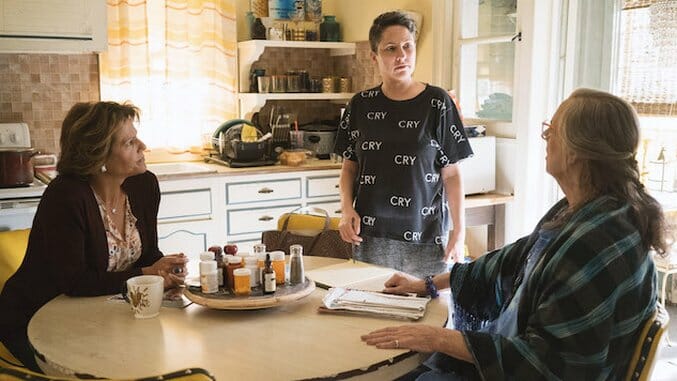Jill Soloway on I Love Dick, Transparent and the Importance of Trans Emmy Nominees
Photo: Amazon Prime Video
Jill Soloway has changed the game many times over, since creating their Emmy Award-winning series Transparent, and this year’s incredible I Love Dick. What’s exciting about watching their work continuously evolve into more politically radical spheres is the knowledge that Soloway is only just getting started. Their latest campaign is not just about nabbing some well-deserved Emmy nominations for the talented trans people involved with I Love Dick and Transparent—as well as music supervisor Bruce Gilbert and cinematographer Jim Frohna, whose respective categories have been established for the first time this year—it’s about reshaping the conversation about the awards themselves, including the acknowledgement that economic justice can come from the celebration of work by people who are not white, male and cis.
“Is it too much to ask that Alexandra Grey, Trace Lysette, and Sophia Grace all get nominated?” Jill queries. “Would that be weird, for like three of the five actress nominees to be trans women?”
Grey plays Elizah in Transparent’s powerful Season Three opener, titled after her character; Lysette gives an incredible turn as Shea over the course of the season and Grace is the young trans girl who blew us all away in the flashback episode “If I Were a Bell” (and made history as the first young trans actor on TV in the process). “If I Were a Bell” was also written by a trans woman, Our Lady J—and Soloway, decidedly tired of pretending they don’t want awards for their colleagues—is campaigning for her too.
“A nomination is a life-transformer. They give you economic security. They give you respect.”
For Soloway, it’s time to acknowledge that an award for a trans person, a black person or a person of color is not the same thing as an award for a white man (for that matter, it’s also not the same as awards for straight white women).
“When I look at someone like [the director of Transparent’s Season Three finale] Marta Cunningham, or Alexandra Grey, and I think a woman of color director and a trans woman of color actor—is it really about desire, or desire to win?” Soloway asks. “I’m willing to be competitive, because it means economic justice and social justice, and it means winning financially for the people that deserve it. The problem of the self-congratulation party applies to men, and white men who’ve been in the business forever. So awards got this sheen on them, of these people congratulating themselves. Well, not really—not when Moonlight wins! It’s not people congratulating themselves. It’s actually re-shaping and re-shifting an economic scenario, and opening up avenues of power to people who haven’t had it.”
Whether the Emmys choose to celebrate the work of the trans artists and people of color Soloway continues to employ or not, the writer/producer says they are forever moved by the experience of working on both shows.
“I feel mostly, incredibly grateful all the time. I can’t believe my luck, and I can’t believe the creative freedom that Amazon has given me.”
When we discuss “If I Were a Bell,” Soloway calls the work revolutionary, because, “normally men or cis people are writing what they think trans people are.” Such material at best lacks authenticity, and at worst becomes objectifying. Soloway mentions a concept they heard from director Ava DuVernay about the importance of going beyond mere depiction and moving towards reflection—having trans people tell their stories, in the same way that black people must be able to tell theirs.
“Our Lady J pulled on her childhood experiences. The kid on the baseball field who everyone thinks is a boy and fantasizes—that’s straight from her.” Soloway also cites the Red Rover game in the episode, with girls on one side and boys on the other, where young Maura (as Mort) knows she’s on the wrong side. Soloway’s own Moppa’s experiences growing up in London and having to spend time in a bomb shelter also informed several of the episode’s powerful moments.
In addition to providing the material for one of the series’ most poignant installments, Soloway says that having Our Lady J resulted in some unforgettable on-set experiences—specifically, watching young Sophia Grace interact with Lady J and the other trans people on the show.
-

-

-

-

-

-

-

-

-

-

-

-

-

-

-

-

-

-

-

-

-

-

-

-

-

-

-

-

-

-

-

-

-

-

-

-

-

-

-

-








































